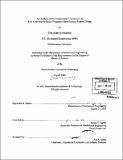An analysis of the fundamental constraints on low cost passive radio-frequency identification system design
Author(s)
Scharfeld, Tom Ahlkvist, 1976-
DownloadFull printable version (8.932Mb)
Other Contributors
Massachusetts Institute of Technology. Dept. of Mechanical Engineering.
Advisor
Sanjay E. Sarma.
Terms of use
Metadata
Show full item recordAbstract
Passive radio frequency identification (RFID) systems provide an automatic means to inexpensively, accurately, and flexibly capture information. In combination with the Internet, which allows immediate accessibility and delivery of information, passive RFID systems will allow for increased productivities and efficiencies in every segment of the global supply chain. However, the necessary widespread adoption can only be achieved through improvements in performance - including range, speed, integrity, and compatibility - and in particular, decreases in cost. Designers of systems and standards must fully understand and optimize based on the fundamental constraints on passive RFID systems, which include electromagnetics, communications, regulations, and the limits of physical implementation. In this thesis, I present and analyze these fundamental constraints and their associated trade-offs in view of the important application and configuration dependant specifications.
Description
Thesis (S.M.)--Massachusetts Institute of Technology, Dept. of Mechanical Engineering, 2001. Includes bibliographical references (leaves 110-115).
Date issued
2001Department
Massachusetts Institute of Technology. Department of Mechanical EngineeringPublisher
Massachusetts Institute of Technology
Keywords
Mechanical Engineering.